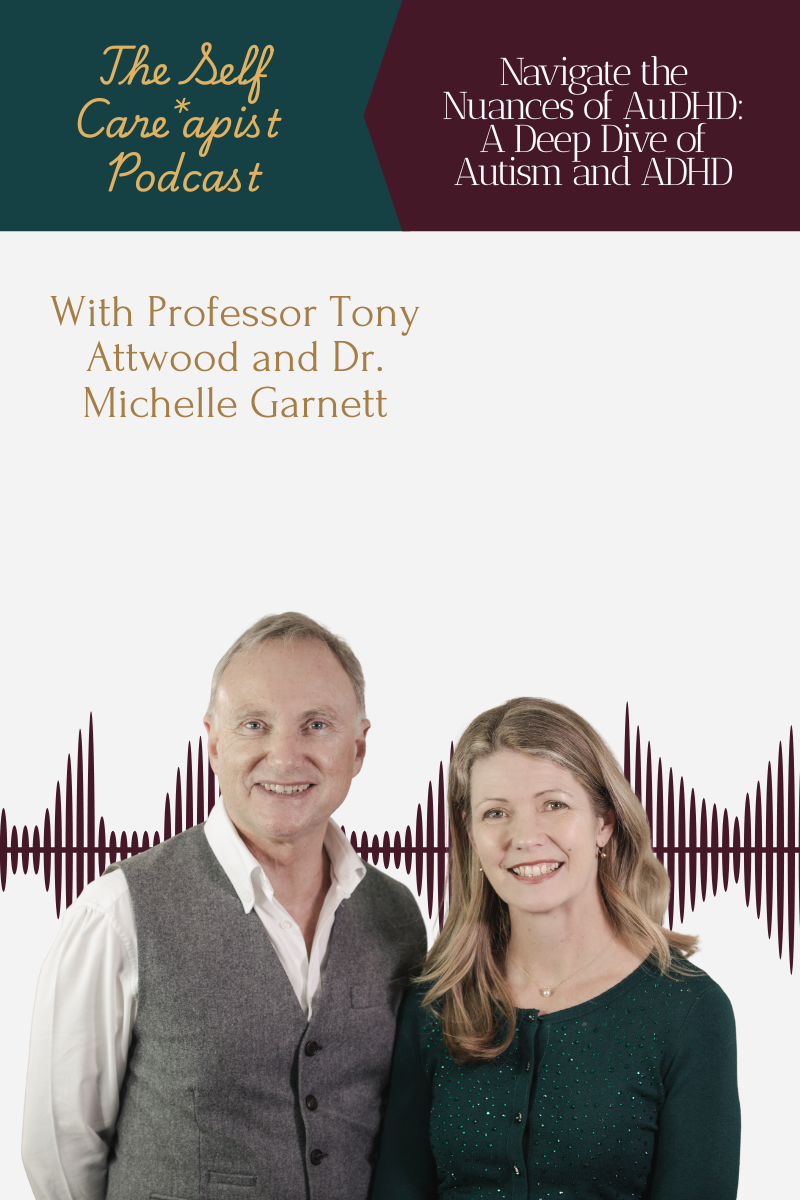AuDHD: When Autism and ADHD Overlap in Therapy and Identity
For decades, autism was seen through a narrow lens that often missed the vibrant complexity of real people. In this episode of The Self Careapist Podcast, Lorain Moorehead, LCSW, speaks with world-renowned experts Dr. Tony Attwood and Dr. Michelle Garnett to explore what happens when autism and ADHD intersect, a presentation often called AuDHD.
Dr. Attwood and Dr. Garnett trace their journeys into the field, describe the shift from “autism pure” to “autism plus,” and explain why understanding neurodiversity requires moving from behavior to neurology, from correction to compassion.
Autism Pure and Autism Plus
As Dr. Attwood notes, “It’s rare to get what we call autism pure, it’s nearly always autism plus: ADHD, mood disorders, specific learning difficulties, and so on.”
This expanded understanding helps clinicians and clients alike recognize that co-occurring conditions are not outliers, they are part of the picture. Recognizing “autism plus” changes how therapy unfolds: instead of labeling traits as problems, it reframes them as patterns to understand and support.
Camouflaging and the “Spoken Social Story”
Many autistic individuals learn to camouflage to mimic neurotypical behaviors in order to belong. While camouflaging can help someone get through school or work, it often comes with exhaustion and shame.
Dr. Garnett recommends teaching clients to replace camouflaging with what she calls the “spoken social story,” a simple, authentic way to self-advocate. Instead of disclosing a diagnosis, a client might say, “I’m the sort of person who needs to look away while thinking, it helps me focus.” This brief script reframes difference as personal style rather than deficit, building self-identity and confidence.
To explore camouflaging patterns, Dr. Garnett recommends the
Camouflaging Autistic Traits Questionnaire (CAT-Q) and the
Modified Questionnaire for Autism Spectrum Conditions (MQ-ASC).
Gender Differences and Masking
Women and gender-diverse people can be likely to camouflage or mask their traits due to societal expectations and influence. As Dr. Garnett explains, “We’ve shifted from talking about ‘female autism’ to the camouflaging subtype, because it includes everyone who hides parts of themselves for safety or acceptance.”
This distinction matters. Many adults are first recognized only after a child’s diagnosis or after a period of burnout. Understanding gendered expectations and masking patterns helps clinicians approach diagnosis and therapy with nuance rather than stereotypes.
Emotional Awareness, Alexithymia, and the Wheel of Emotion
Many neurodivergent people experience alexithymia, or difficulty identifying emotions in themselves. That is why both guests advocate tools that bring feelings into focus. Visual aids like the
Wheel of Emotion
can help clients build emotional vocabulary and connect sensations to language, an important step in trauma-informed, neurodiversity-affirming care.
Energy Accounting: A Practical Tool for Burnout
Clinical psychologist Maja Toudal developed energy accounting, a strategy that balances daily tasks that drain energy with those that restore it.
Dr. Garnett calls it “incredibly neuro-affirming,” because it invites clients to design life around what replenishes them rather than what depletes them. For many autistic or ADHD individuals, stimming, movement, and solitude are not avoidance, they are emotional regulation.
From Mind to Body: Therapy That Honors Difference
The episode emphasizes interoception (the awareness of internal sensations) and monotropism, a concept expanded on by Dr. Damian Milton and Fergus Murray and recently developed further by Dr. Luke Beardon and Dr. Dinah Murray Lawson. Monotropism describes deep, focused attention, a natural autistic strength that can be misunderstood as rigidity.
By respecting how each brain processes information, clinicians can adapt modalities like EMDR, DBT, and ACT to fit neurodivergent minds, focusing on acceptance, not correction.
Diagnosis as Discovery
For many, learning they are autistic or ADHD brings relief and grief in equal measure. As Dr. Garnett reflects, “It’s a gift to yourself, but it can bring big feelings. There’s joy and relief, and sometimes grief too.”
Diagnosis, whether formal or self-discovered, can transform therapy. When clients view their past “through the lens of autism,” they often find compassion, clarity, and freedom to live authentically.
Explore More from Dr. Attwood and Dr. Garnett
You can explore their extensive library of trainings on autism, ADHD, gender, and neurodiversity for clinicians, educators, and families.
About This Episode
This conversation between Lorain Moorehead, LCSW, Dr. Tony Attwood, and Dr. Michelle Garnett explores the intersection of autism, ADHD, and mental health through the lens of compassion, science, and lived experience.
Tune in to The Self Careapist Therapist Podcast for more real, honest conversations about therapy, healing, and self-understanding.

+ show Comments
- Hide Comments
add a comment